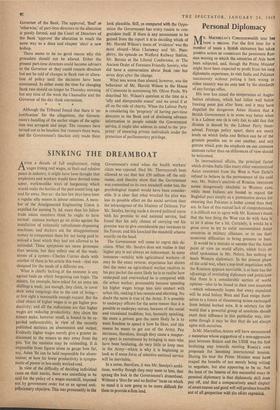SINKING THE DREAMBOAT
AFTER a decade of full employment, rising wages (rising real wages, at that) and relative peace in industry, it might have been thought that employers and workers would have devised some sober, workmanlike ways of bargaining which would make the battles of the past sound long ago and far away. Not so : the last few days have been a regular silly season in labour relations. A mem- ber of the Amalgamated Engineering Union is expelled for earning 7s. 6d. more than his fellow• trade union members think he ought to have earned : canteen workers go on strike against the installation of automatic refreshment-dispensing machines; and dockers ask for disappointment money to compensate them for not being paid to unload a boat which they had not allowed to be unloaded. These symptoms are more grotesque than serious; but they reflect one of the weak- nesses of a system—Charles Curran deals with another of them in his article this week—that was designed for the needs of a different era.
What is chiefly lacking at the moment is any agreed basis on which bargaining can begin. The miners, for example, have asked for an extra ten shillings a week; just enough, they claim, to cover their extra outgoings due to the cost of living— at first sight a reasonable enough request. But the chief object of higher wages is to get higher pro- ductivity; and all the indications are that higher wages are reducing productivity. Any claim the miners make, however small, is bound to be re- garded unfavourably, in view of the recently published statistics on absenteeism and output. Evidently higher wages merely give a greater in- ducement to the miners to stay away from the pits. Yet the statistics may be misleading. It is impossible from figures alone to gauge how far, say, Asian 'flu can be held responsible for absen- teeism; or how far lower productivity is sympto- matic of poorer or less easily worked coal.
In view of the difficulty of deciding individual cases on their merits, there was something to be said for the policy of a wages standstill, imposed not by government order but as an agreed anti- inflationary objective. This was presumably in the Government's mind when the health workers' claim was rejected. Had Mr. Thorneycroft been allowed to cut that last 150 million off the esti- mates, and thereby show that the Government was committed to its own standstill order too, the psychological impact would have been consider- able. It is clear that what wrecked the plan was less its possible effect on the social services than the intransigence of the Minister of Defence. For Mr. Sandys, having made a shrewd political move with his promise to end national service, had found that his only chance of carrying out his promise was to give considerable pay increases to the Forces; and this knocked the standstill scheme smartly on the head.
The Government will come to regret this de- cision. What Mr. Sandys does not realise is that 'higher pay is not always an inducement. In some instances—notably with agricultural workers—it may be the exact reverse; experience has shown that the more an agricultural worker receives in his pay packet the more likely he is to realise how underpaid and overworked he is compared with the urban worker; presumably because spending his higher wages brings him into contact with urban life, making it less remote and alarming. No doubt the same is true of the Army. It is possible to underpay officers for the same reason that it is possible to underpay nurses, because of the social and vocational tradition; but, humanly speaking, the more a private gets the more likely he is to want freedom to spend it how he likes; and this means he wants to get out of the Army. Pay increases, therefore, though they cause a tempor- ary spurt in recruitment by bringing in men who have been hesitating, do very little to keep men in the Army—which is why it is beginning to look as if some form of selective national service will be inevitable.
In a sense, therefore, it was Mr. Sandys's ambi- tions, worthy though they may seem to him, that sprang the leak in the Government's dreamboat. Without a 'thus far and no farther' basis on which to stand it is now going to be more difficult for them to provide a firm lead.


































 Previous page
Previous page